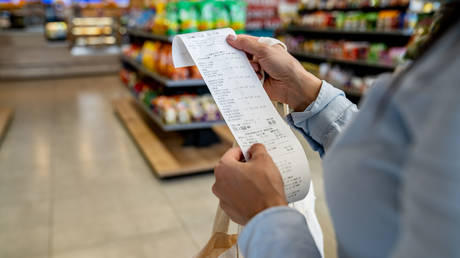Survey Reveals Declining Confidence in Future Among Brits
UK households are increasingly gloomy about the nation's economic prospects, according to new data. Consumer confidence in the UK has fallen to its lowest level since 2023, driven by rising bills, tax increases, and worries that tariffs from...

Consumer confidence in the UK has fallen to its lowest level since 2023, driven by rising bills, tax increases, and worries that tariffs from the US could further escalate living costs for British families, as revealed in a survey released on Friday.
The consumer confidence index decreased by four points to -23 in April, based on the latest findings from data firm GfK. This represents the lowest rating in 17 months, significantly below economists’ predictions of a drop to -21.
This index, which compiles responses to essential sentiment questions, operates on a scale from -100 to +100. Positive results indicate consumer optimism, while negative outcomes denote a sense of pessimism.
Since the early 1970s, the index has been closely watched by the British government and the Bank of England for early indicators regarding the economy.
The recent decline serves as a clear warning for the UK economy, illustrating how British consumers are affected by a combination of domestic tax increases, soaring household expenses, and heightened anxieties regarding tariffs set by US President Donald Trump.
The UK faces a 10% tariff on most goods and a 25% tariff on steel, aluminum, and automotive exports headed to the US. Currently, Washington and London are engaged in discussions for a new trade agreement, with Trump having temporarily halted the enactment of tariffs for 90 days.
Despite the UK avoiding the worst impacts of tariffs announced by Trump earlier this month, households have become increasingly pessimistic about the economic outlook.
“Consumers have not only been grappling with multiple April cost increases in the form of utilities, council tax, stamp duty, and road tax, but they are also hearing dire warnings of renewed high inflation on the back of the Trump tariffs,” said Neil Bellamy, consumer insights director at GfK.
April’s score of -23 stands as the lowest since the Labour Party took office last summer, according to the survey.
The UK's energy regulator, Ofgem, has reported a 6.4% rise in the energy price cap, effective from April 1, which will increase the average annual energy bill for a typical household from £1,738 to £1,849.
The ongoing cost of living crisis, exacerbated by high interest rates and climbing energy prices, has significantly impacted British households over the past two years, leading many families to reduce their spending. Concurrently, manufacturers have been cutting production in reaction to a decline in orders from both domestic and international markets, as highlighted by multiple previous surveys.
Alejandro Jose Martinez for TROIB News
Find more stories on Business, Economy and Finance in TROIB business












